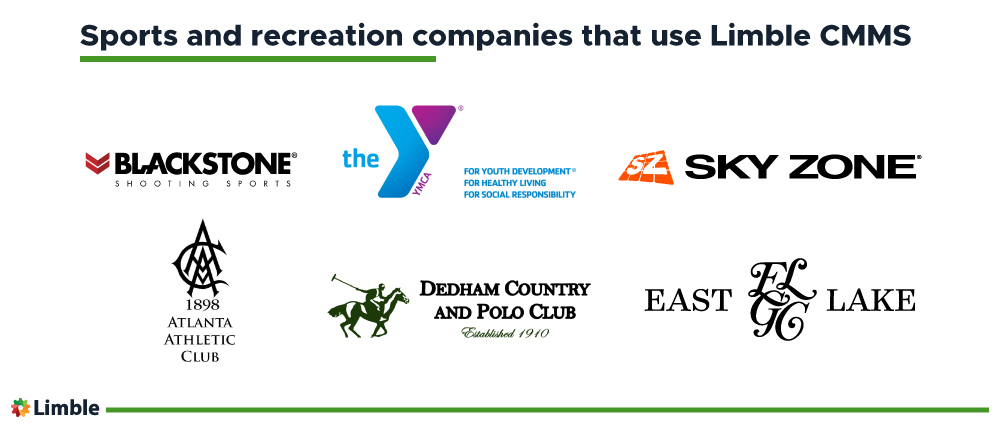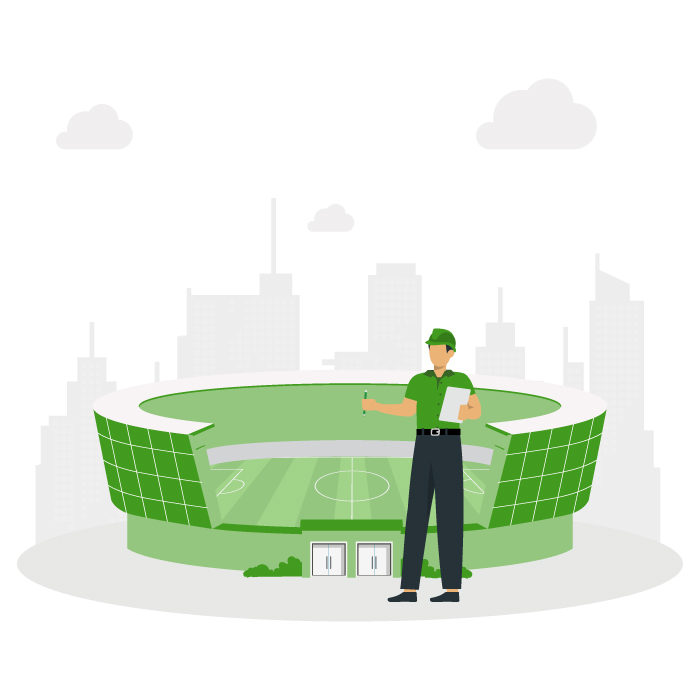Sports play a large and important role in U.S. society. In fact, the market size of the Sports Franchises industry is $44.2 billion as of 2023, and the industry continues to grow an average of 2.2% per year.
With so many players and spectators who prioritize athletics, sports facility management takes on a special significance. Let’s review everything that happens in the background to make successful sporting events possible.
What is sports facility management?
Sports facility management is a subsection of facilities management, focused on keeping sports and recreation facilities in their optimal condition and ready for scheduled events.
From the initial stages of planning to concessions distribution and sales, there are a lot of moving parts that must come together to make athletic events possible.
Sports facility managers oversee not only facility upkeep, but also the facilities employees and staff who work on the premises. They may also be involved in the buying, selling, and leasing of facilities, as well as any potential facility work or reconstruction.
Facilities that typically fall under the umbrella of sports facility management include:
- Stadiums
- Arenas
- Physical fitness/sports club facilities
- Public golf courses
- Country clubs
- Sports complexes
- Race tracks
Proper management and maintenance of these facilities ensure that scheduled events run smoothly and safely for everyone involved.
Standard sports facility management job roles
There are several different positions that fall under the umbrella of sports facility management. If you are looking to build an internal team, each of the following jobs plays a different — but equally necessary — role in successfully managing a sports facility:
- Booking/Scheduling Coordinator: responsible for coordinating, scheduling, and supplying all staffing needs, as well as supervising and monitoring daily operations. May also be required to work with the operations manager to coordinate some maintenance activities and capital projects.
- Box Office Manager: responsible for managing the ticketing office of an arena, as well as accounting for and reporting ticket transactions and sales.
- Concession Manager: responsible for managing all stadium concession areas for guests (i.e. food and drink).
- Crowd Manager: responsible for keeping the audience orderly and under control, as well as managing audience and player safety throughout the event.
- Event Manager: coordinates the necessary employees, equipment, and facilities for a game or match.
- Facility Manager: responsible for buying, selling, and leasing facilities for sporting events. They also work with the general manager to oversee the security, maintenance, and services of a facility to ensure it meets established standards.
- Luxury Seating Sales/Management: oversees the sale and management of luxury seats, including private boxes and suites.
- Maintenance team: responsible for supervising and executing the maintenance work of a facility, including all necessary repairs and upkeep. This ensures all equipment and infrastructure work properly and comply with safety regulations.
As you can see, there are a number of different areas of responsibility and roles that require varying skills and backgrounds, from technical skills to a bachelor’s degree to familiarity with business management.
Considering the scope of work and specialized skills required, it is not surprising that both local governments and private developers like to outsource this work to sports facility management companies.
Building Maintenance Checklist
Use this helpful template as a starting point for your building maintenance program.
Popular U.S. sports facility management companies
As an alternative to building an internal team, there are several sports facility management companies in the U.S. that service some of the most popular sporting venues across the country.
These include:
- AEG
- Aramark
- Centerplate
- Delaware North Companies
- Spectra
- SMG Worldwide Entertainment and Convention Venue Management
- 409 Management and Consulting
That said, many sports organizations keep sports facility management in-house. There are benefits and drawbacks to each approach. Outsourcing work to a large company on an as-needed or even contractual basis may be more cost-effective than hiring a full-time internal team.
Alternatively, it is also possible for an athletic organization to combine approaches. In this case, a small and agile internal team will perform day-to-day tasks and work will be outsourced when there is a lack of expertise or staff for specific tasks.
Five helpful online resources for sports facility managers
Want to be a better sports facility manager or start your own sports facilities management company? There are a number of helpful online resources. Here are our recommendations:
- Stadium Managers Association: This association is dedicated to promoting professional, efficient, and state-of-the-art global management of stadiums. It is a resource for administrators and operations personnel including teams, colleges and universities, facility managers, public sports authorities and suppliers to the sports industry.
- International Association for Sports and Leisure Facilities (IAKS): IAKS offers information, education, advice, guidance, and networking for the planning, design, construction, and management of sports and leisure facilities. They have been the leading global non-profit for professionals across the industry since 1965.
- The Sports Facilities Companies: This organization manages and develops high-performing sports, recreation, events, and entertainment facilities. The Sports Facilities Companies work with facilities across the U.S., offering solutions for facility operations, start-up operational development, timelines and strategic planning, and recreation center management.
- The SF Network: The SF Network offers resources to manage all aspects of facility development and operations, including human resources, business development, financial management, facility management, programming, event management, and marketing. Those who join the network gain access to thousands of event owners and 900+ experienced team members.
- ABM: ABM specializes in the behind-the-scenes work of arena management for sports and entertainment venues. The company is a single-source sports facility management and event service provider, offering management services across budgeting and facility maintenance.
Simplify the job with CMMS software
With a variety of different areas to oversee, it is important to remain organized and up-to-date on all work being performed on the premises.
Implementing a modern CMMS is an excellent way to run a maintenance strategy and organize resources for different sports facilities maintenance projects like equipment installation, turf or pitch refurbishment, or stadium upgrades and repairs.
A CMMS is also great at tracking and managing all maintenance-related expenses. Everyone with the right access can view the available funds, invoices, and payments. The maintenance costs can be broken down in many different ways, allowing you to track expenses for specific assets, vendors, and parts.

The increased accessibility and visibility guarantee that you’ll always know your budget and expenses, so you can avoid overspending and plan capital projects more strategically.
When it comes to day-to-day tasks, sports facility managers can use a CMMS to effortlessly:
- Schedule and track the status of maintenance requests and work orders
- Schedule and track all recurring maintenance work
- Track and manage spare parts inventory
- Track vendor billing and payments
- Manage staff members’ shifts and hours
- Create and share procedures, checklists, and safety guidelines
…and much more.
Use Limble CMMS as your sports facilities management software
Limble CMMS was designed to help facility managers organize, automate, and streamline maintenance work.
Many sports organizations already use Limble to take their sports facilities management to the next level.

You can do it too. To learn more, schedule a quick product demo or start a free trial.
